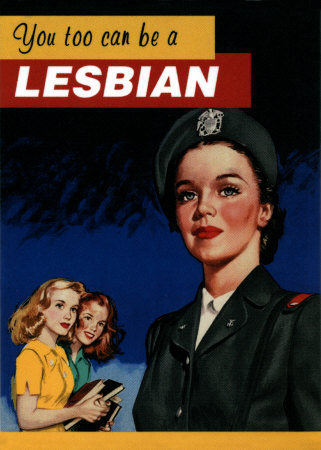In the United States, World World II was a real game changer for women who loved other women. The de
In the United States, World World II was a real game changer for women who loved other women. The demand for labour created a sudden 180 degree turn in the attitude towards lesbianism. Lesbians were considered to be monstrosities the 1930s (read more about it HERE) but in the 1940s the love between females was temporarily understood, undisturbed, and even protected in the military. And in many interesting ways inadvertently sponsored the growth of lesbian subculture.DURING THE WAR:Military service was an opportunity to meet other women and to engage in work and adventure that they were normally denied. Reminiscent of all women’s colleges, women worked in tight quarters free that allowed close relationships to develop unfettered by societel dictates. When it became clear for the Women’s Auxiliary Army Corps (WAAC) that women who loved other women worked amongst them they took clear measures to cover it up without compromising their productivity. They did so by:Warning officers not to go on witch-hunts to expose or punish such behaviour “any officer bringing an unjust or unprovable charge against a women in this regard will be seriously reprimanded”Ordering the officers to be sympathetic to close friendships that “may eventually take some form of sexual expression” - you know, just gals being pals.Actions against lesbianism was only to be taken if its “manifestations undermine the efficiency of the individual concerned and the stability of the group”AFTER THE WAR:Increased tolerance among young women - even those who weren’t lesbians developed “Who care’s” kind of attitude.The military even helped to introduce lesbian who had honuorable discharges to large metropolitan areas where they could meet women like themselves.This helped create large homosexual enclaves - for the first time there were number of American bars that could survive if they catered exclusively toward lesbians.Ex-military women stayed because they found anonymity of a big city to be more compatible with what became their life choices.To add to this, lesbians once again had the means to be financially independent and build a life with their partner. = Overall, these opportunities account for the incipient lesbian political consciousness in the United States. (It is also important to note that this is far from how homosexual men were treated in the military. More about that in a future post)This is part 3 of this series. Read part 1 HERE and part 2 HERESources:Odd Girls and Twilight Lovers - a History of Lesbian Life in 20th-Century America by Lillian Faderman -- source link
Tumblr Blog : lgbtq-history-blog.tumblr.com
#lgbt history#lgbtq history#lesbian history#us history#lesbian#history#gay history#world war 2
